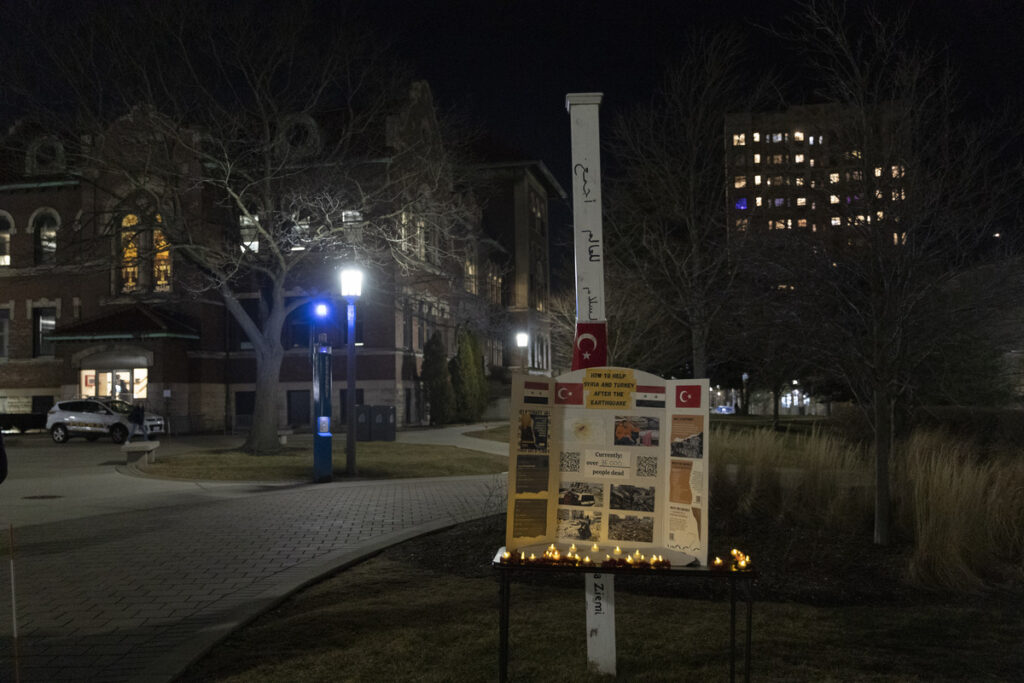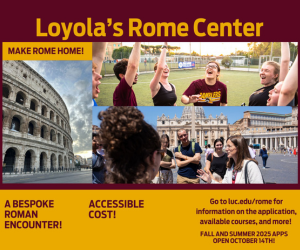Loyola students speak out about how the earthquake in Turkey and Syria affected them.
Students Gather in Response to Earthquake in Turkey and Syria
A magnitude 7.8 earthquake struck Turkey and Syria Feb. 5 and left over 39,000 people dead across both countries and over 105,000 injured, the Associated Press (AP) reported. The earthquake is one of the deadliest in nearly a decade, leveling thousands of buildings across the two countries. Rescue crews are still looking for survivors.
Loyola’s Campus Ministry hosted a vigil Feb. 13 to raise awareness for the damage from the earthquake. Around 20 people gathered in a circle by the peace pole at the East Quad while students spoke about the events and how they were impacted.
Loyola student Sude, who didn’t want to share her last name for privacy reasons, said she lost 16 relatives on her mother’s side due to the earthquake. She said thankfully, her grandparents, who live in Istanbul, were safe.
“[My family is] grieving the loss of all of their loved ones and relatives,” Sude said. “They all grew up together. My parents moved here in 2000 so they all grew up with them too. They’re all grieving and I’m grieving too.”
Murathan Oktar, a master of laws student from Antalya, Turkey, said his family is safe but he has four friends whose families don’t have access to their homes. They all had to be moved as a result of the damage caused by the earthquake.
“I couldn’t reach one of my friends for like two days,” Oktar said. “I was worried, and I thought that she was dead, but thank God I received a message from her. They moved her family to a different city.”
Oktar said one of his friends lost 100 relatives in the earthquake.
“It is so hard for us and right now we are trying to be a voice for that and raise awareness,” Oktar said. “It helps getting donations or getting prayer from different students at Loyola.”

Ayse Gulsen, a student who helped organize the vigil, said she personally didn’t have any family members who were impacted by the earthquake but knows a lot of community members and friends who were impacted.
“Hearing the numbers, seeing the pictures, seeing the videos is horrible,” Gulsen said.
Gulsen said the main goal of the vigil was to raise awareness and collect donations, pray, and raise funds to help the people impacted.
At the same time as the vigil, Students For Syria held a meeting in the Damen Den. The group is focused on raising awareness about the monstrosities occurring in Syria and their contribution to the influx of refugees coming into the United States, according to President Manar Kashk.
Over 4,500 Syrian refugees entered America in 2022, according to Statista.
During the meeting, club leaders gave a presentation on the history of Syria leading up to the earthquake.
They shared videos of Syria before and after the earthquake from family members and Al Jazeera before facilitating a Miracle Minute where attendants pooled donations to raise approximately $700.
Kashk, a half-Syrian, half-Egyptian biology major, said that fortunately none of her immediate family was impacted but a number of her mother’s cousins had to leave their homes — one of which had a newborn.
“Even though I don’t have anyone who has been personally affected, I still feel the pain, because I’ve seen what’s happened throughout the past 12 years,” Kashk said. “I’ve had family that have had to leave from other bombings. I’ve had family members that have been killed through this.”
Kashk said she’s been working to accurately portray to the Loyola community how harmful the earthquake has been on top of the years of war Syria has experienced.
Since 2011, Syria has seen peaceful protests become a full-blown civil war, according to the AP. The country has been economically devastated and divided into three parts, the AP reported. As of June, it has been estimated that over 306,000 civilians have been killed due to the civil war since 2011, according to the United Nations.
“We see all the numbers, we see, ‘Oh my gosh, an earthquake happened,’ but no,” Kashk said. “An earthquake happened on top of twelve years of war.”
Kashk encouraged Loyola students to donate if they can, raise awareness and stay updated on the situation.
This story was written by Nicky Andrews and Isabella Grosso





